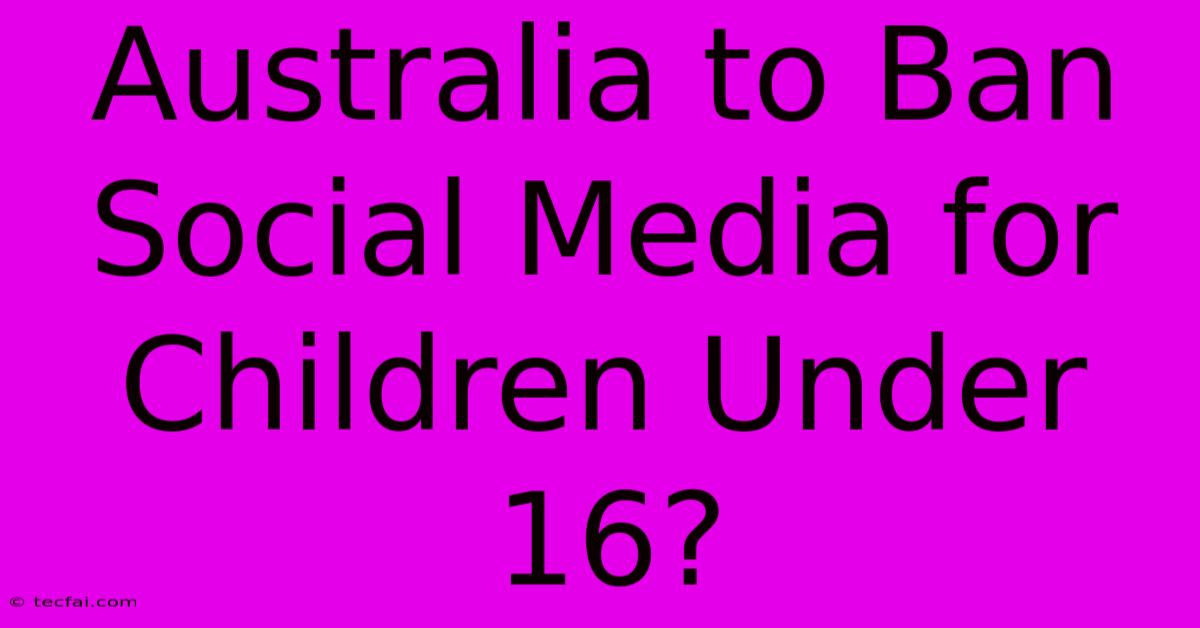Australia To Ban Social Media For Children Under 16?

Discover more detailed and exciting information on our website. Click the link below to start your adventure: Visit Best Website tecfai.com. Don't miss out!
Table of Contents
Australia to Ban Social Media for Children Under 16? Exploring the Potential Impact
The Australian government is considering a controversial new law that would ban children under 16 from using social media platforms like Facebook, Instagram, and TikTok. While the proposed legislation aims to protect young people from the potential harms of online platforms, it has sparked a fierce debate about parental rights, digital literacy, and the future of online interaction for teenagers.
The Argument for a Ban: Protecting Children in the Digital Age
Proponents of the ban argue that children under 16 are particularly vulnerable to the negative impacts of social media, including:
- Cyberbullying and harassment: The anonymity and reach of online platforms can exacerbate bullying and create a hostile environment for young users.
- Mental health issues: Studies have linked excessive social media use to increased anxiety, depression, and body image concerns among teenagers.
- Privacy and data security: Children may not fully understand the risks associated with sharing personal information online, leaving them susceptible to exploitation and identity theft.
- Addiction and screen time: Social media platforms are designed to be addictive, leading to excessive screen time and neglecting other important activities like education, physical activity, and social interaction in the real world.
The Australian government believes that a ban would provide a necessary layer of protection for young people, allowing them to develop healthy digital habits and avoid the potential harms of early social media exposure.
The Opposition: Concerns about Parental Rights and Digital Literacy
Opponents of the ban raise several concerns, including:
- Parental rights and autonomy: Many argue that parents should have the right to decide when and how their children engage with social media, not the government.
- Digital literacy and education: Instead of banning access, opponents advocate for educating children and parents about the risks and responsible use of social media.
- Missed opportunities for learning and connection: Social media can be a valuable tool for learning, connecting with friends and family, and participating in online communities. Banning access could hinder these opportunities.
The critics argue that a ban would not address the root causes of social media harms and could ultimately be counterproductive.
The Road Ahead: Balancing Safety and Freedom
The proposed ban in Australia raises complex questions about the role of government in regulating online spaces. It is essential to engage in a nuanced and informed discussion about the potential benefits and drawbacks of this policy.
Ultimately, any solution should prioritize the safety and well-being of children while respecting parental rights and promoting responsible digital citizenship.
Further research and public dialogue are needed to find a balance between protecting children from online harms and enabling them to navigate the digital world safely and responsibly.
This legislation could set a precedent for other countries, prompting a global conversation about the appropriate age for social media access and the role of technology in shaping the lives of young people.

Thank you for visiting our website wich cover about Australia To Ban Social Media For Children Under 16? . We hope the information provided has been useful to you. Feel free to contact us if you have any questions or need further assistance. See you next time and dont miss to bookmark.
Featured Posts
-
Eustace Praises Top Performance
Nov 07, 2024
-
Gold Rates India November 7 2023 Update
Nov 07, 2024
-
Honig Reacts Jack Smiths Potential Result
Nov 07, 2024
-
Governor Walz Post Trump Election
Nov 07, 2024
-
Live Club Brugge Aston Villa Champions League
Nov 07, 2024
